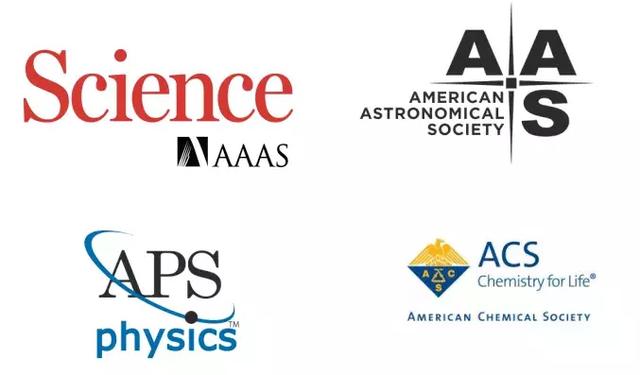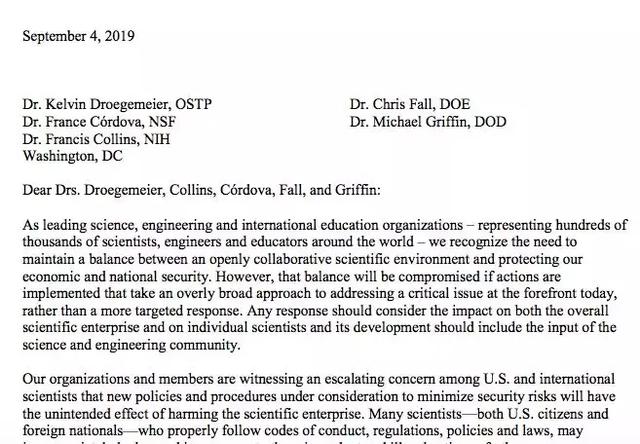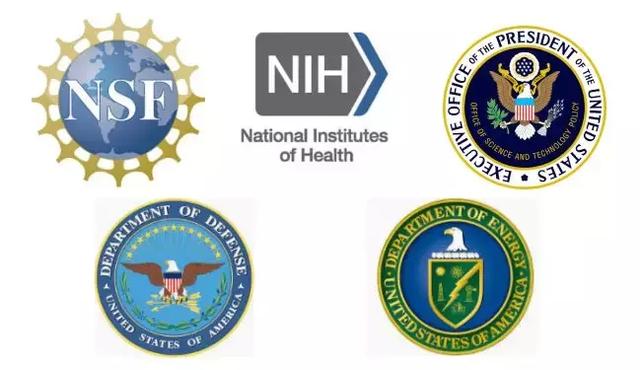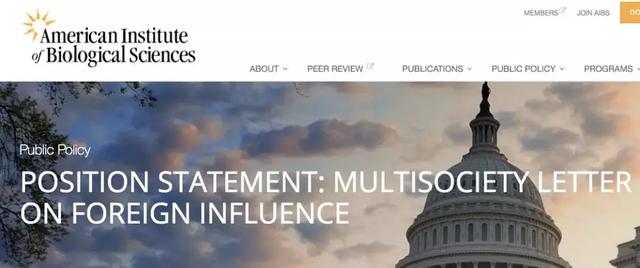美國科學促進會等60個主流學術團體聯名寫公開信
撰文 | 葉水送
最近一段時間,由于擔心外部勢力影響美國的基礎科學並竊取知識産權,美國國會以及科研管理機構加大了對國外學者的審查(主要以華人學者爲主),並開除了數名華人學者。部分華人學者以辭職或提前退休的方式,離開美國。
美國60個學術團體聯署致信美國白宮科學顧問辦公室、美國國家科學基金會和美國國立衛生研究院,對美國政府關于外國勢力的一系列行動表示擔憂。
9月4日,美國科學促進會等60個美國主流學會及學術團體,聯名致信美國白宮科學顧問辦公室(OSTP)、美國國家科學基金會(NSF)、美國國立衛生研究院(NIH)、美國能源部(DOE)以及美國國防部(DOD),對當下的局面表示擔憂。
美國60個主流學會或團體向美國5大職能部門聯名寫公開信
相關學術組織同步發布了這一信息
“我們需要平衡開放合作的科研環境與保護經濟以及國家安全之間的關系,如果當下的舉措過于廣泛,而沒有一個更具針對性的目標,這種平衡將受到影響。” 該聯名信認爲,目前美國政府審查的範圍過于廣泛,已影響到正常工作的科研工作者。
聯署此次公開信的學術團體包括美國數學學會、物理學會、化學學會、紐約科學院等,它們均爲美國主流的學會組織及學術團體。
“我們的組織和成員看到,美國以及國際科學家正在愈來愈擔憂,爲減少國家安全風險而制定的新政策和程序將對美國的科學事業産生意想不到的後果”,公開信表示, “來自美國以及其他國家的許多科學家,他們恰當地遵循行爲准則、法規、政策和法律,但因其他人的不端或非法行爲,而受到傷害。”
這些學術團體還認爲,半個世紀以前,美國之所以成爲全球科學與技術的中心,主要是因爲他們擁有吸引全球的科學家和學生的能力,這些科學家爲全球的科學事業做出了卓越貢獻。他們同樣也能驅動美國科學與技術的發展。
但如今,由于對科研誠信以及國家安全的關注,美國國會及其職能部門加大了對國外勢力的審查,包括在美國學習、工作以及同美國科研機構合作的研究人員。
“一方面我們應當小心保護研究,另一方面我們必須確保美國是一個理想的以及受歡迎的學術目的地。” 該公開信表示。
公開信繼續表示,在國家安全和開放、合作的科研環境之間保持平衡,需要聚焦和謹慎的調查,而不應將審查的範圍擴大,傷害到其他正常的工作人員。
目前,美國不少高校響應國會的政策,開始系統性地排查“國外勢力”的滲透。7月份,美國兩黨參議員還推出了《保護美國研究法案》(Secure American Research Act),以防止外部勢力幹預、滲透美國的基礎科學。
受這一系列政策影響,部分華人學者業已離開美國或提前退休,返回中國並非他們的唯一選擇,也有部分學者選擇去新加坡等國家或地區。
聯名信單位
American Anthropological Association
American Association for Anatomy
American Association for Dental Research
American Association for the Advancement of Science
American Association of Colleges of Pharmacy
American Association of Immunologists
American Association of Physicists in Medicine (AAPM) American Association of Physics Teachers
American Astronomical Society
American Chemical Society
American Educational Research Association American Geosciences Institute
American Institute of Biological Sciences American Institute of Physics
American Mathematical Society
American Meteorological Society
American Nuclear Society
American Physical Society
American Physiological Society
American Society for Cell Biology
American Society for Engineering Education
American Society for Microbiology
American Society for Pharmacology and Experimental Therapeutics American Society of Agronomy
American Society of Human Genetics
American Statistical Association
Association for Computing Machinery (ACM) Association for Research in Vision and Ophthalmology Association of American Medical Colleges
Association of Environmental and Engineering Geologists Biophysical Society
Coalition for the Life Sciences
Crop Science Society of America
Ecological Society of America
Entomological Society of America
Federation of American Scientists Federation of American Societies for Experimental Biology Geological Society of America
Institute of Food Technologists
Institute of Mathematical Statistics
International Academy for Systems and Cybernetic Sciences NAFSA: Association of International Educators
National Cave and Karst Research Institute
New Mexico Academy of Science
New Mexico Geothermal LLC
New York Academy of Sciences
Paleontological Society
Parapsychological Association
Research!America
Social Science Research Council
Society For Biomaterials
Society for Industrial and Applied Mathematics (SIAM) Society for Neuroscience
Society for the Study of Evolution
Society of Toxicology (SOT)
Soil Science Society of America
The International Society for Optics and Photonics (SPIE) The Oceanography Society
OSA—The Optical Society
Western North American Region (WNAR) of the International Biometric Society (IBS)
公開信原文
Dr. Kelvin Droegemeier, OSTP Dr. Chris Fall, DOE
Dr. France Córdova, NSF Dr. Michael Griffin, DOD Dr. Francis Collins, NIH
Washington, DC
Dear Drs. Droegemeier, Collins, Córdova, Fall, and Griffin:
As leading science, engineering and international education organizations – representing hundreds of thousands of scientists, engineers and educators around the world – we recognize the need to maintain a balance between an openly collaborative scientific environment and protecting our economic and national security. However, that balance will be compromised if actions are implemented that take an overly broad approach to addressing a critical issue at the forefront today, rather than a more targeted response. Any response should consider the impact on both the overall scientific enterprise and on individual scientists and its development should include the input of the science and engineering community.
Our organizations and members are witnessing an escalating concern among U.S. and international scientists that new policies and procedures under consideration to minimize security risks will have the unintended effect of harming the scientific enterprise. Many scientists—both U.S. citizens and foreign nationals—who properly follow codes of conduct, regulations, policies and laws, may inappropriately be harmed in response to the misconduct and illegal actions of others.
As you know well, for more than half a century, the U.S. has been the undisputed global leader in science and technology. This leadership is due, in large part, to the U.S. ability to attract scientists and students from around the world, who make countless contributions to the global scientific enterprise. Scientific progress and U.S. economic development have been vastly accelerated by bringing international minds together and has helped to drive innovation and discoveries in cancer and genetics, the physics of gravitational waves, advancements in green chemistry, improving food safety, and other significant contributions.
Recent events make clear that scientific integrity and security concerns are compelling the federal government—both Congress and the Executive Branch—to revisit policies and procedures regarding foreign nationals who study, work or collaborate with U.S. scientific and academic institutions.
While we must be vigilant to safeguard research, we must also ensure that the U.S. remains a desirable and welcoming destination for researchers from around the world. Finding the appropriate balance between our nation’s security and an open, collaborative scientific environment requires focus and due diligence.
We ask that you consider a wide range of stakeholder perspectives as your agencies work together through the new NSTC Joint Committee on Research Environments to develop policies and procedures that address issues related to international researchers’ participation in the U.S. scientific enterprise, and we would welcome the opportunity to work with you.
Thank you for your consideration.
參考資料
美國兩黨參議員推出《保護美國研究法案》,嘗試建立完善的問責制度
http://www.zhishifenzi.com/news/multiple/6563.html
制版編輯 | 皮皮魚



